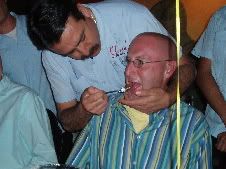 BY JAMES TARANTO
BY JAMES TARANTOTuesday, May 1, 2007 3:32 p.m. EDT
Who Is Jeremiah Wright?
He is pastor of Chicago's Trinity United Church of Christ and the man who led Barack Obama "from skeptic to self-described Christian," reports the New York Times. And he has some ideas and history many Americans will find troubling:
In 1984, he traveled to Cuba to teach Christians about the value of nonviolent protest and to Libya to visit Col. Muammar el-Qaddafi, along with the Nation of Islam leader Louis Farrakhan. Mr. Wright said his visits implied no endorsement of their views. . . .
Mr. Wright preached black liberation theology, which interprets the Bible as the story of the struggles of black people, who by virtue of their oppression are better able to understand Scripture than those who have suffered less. That message can sound different to white audiences, said Dwight Hopkins, a professor at University of Chicago Divinity School and a Trinity member. "Some white people hear it as racism in reverse," Dr. Hopkins said, while blacks hear, "Yes, we are somebody, we're also made in God's image."
It was a 1988 sermon called "The Audacity to Hope" that turned Mr. Obama, in his late 20s, from spiritual outsider to enthusiastic churchgoer. . . .
While Mr. Obama stated his opposition to the Iraq war in conventional terms, Mr. Wright issued a "War on Iraq I.Q. Test," with questions like, "Which country do you think poses the greatest threat to global peace: Iraq or the U.S.?" . . .
Mr. Wright's political statements may be more controversial than his theological ones. He has said that Zionism has an element of "white racism." (For its part, the Anti-Defamation League says it has no evidence of any anti-Semitism by Mr. Wright.)
On the Sunday after the terrorist attacks of 9/11, Mr. Wright said the attacks were a consequence of violent American policies. Four years later he wrote that the attacks had proved that "people of color had not gone away, faded into the woodwork or just 'disappeared' as the Great White West went on its merry way of ignoring Black concerns."
Obama doesn't agree entirely with these sentiments; he says, "The violence of 9/11 was inexcusable and without justification," and explains away his mentor's comments to the contrary as "trying to be provocative."
The piece ends with this revealing quote:
"If Barack gets past the primary, he might have to publicly distance himself from me," Mr. Wright said with a shrug. "I said it to Barack personally, and he said yeah, that might have to happen."
So you see, the real danger here isn't racist or anti-American views. It's cynicism.

No comments:
Post a Comment